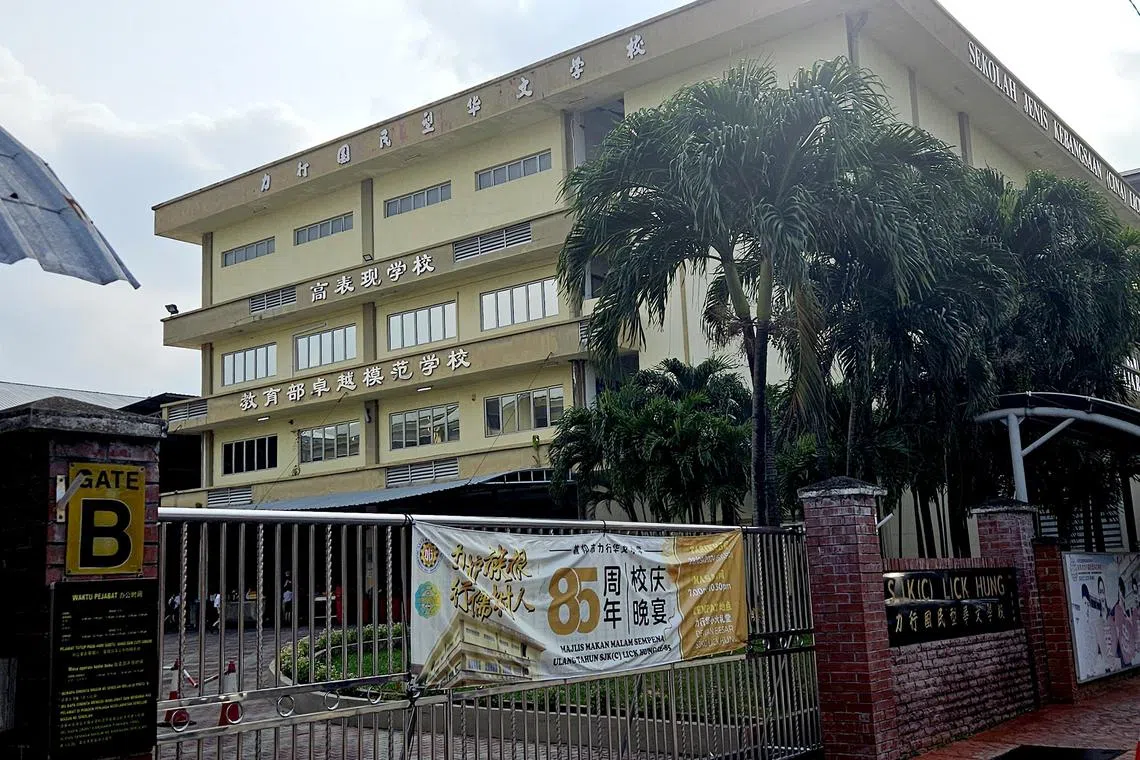Malaysia’s Chinese schools make adjustments as they continue to draw more students of other races
Sign up now: Get insights on the biggest stories in Malaysia

The big shift in demographics has led Chinese schools to look for ways to accommodate the new students and their parents.
ST PHOTO: LU WEI HOONG
Follow topic:
KUALA LUMPUR – Over the past 20 years, educationist Lwi Kian Keong has witnessed the demographics of Chio Chiao Primary Chinese School in his home town south of the Malaysian capital undergo a significant change.
In 2004, 80 per cent of the pupils at this rural Chinese school in Sepang, a township in Selangor state 70km from Kuala Lumpur, were Chinese. Today, 80 per cent of them are Malays.
A similar story is being repeated across Chinese schools all over Malaysia, with an increasing number of non-Chinese enrolments especially from the Malay community, though Mandarin is the main medium of instruction.
The number of bumiputeras studying in the country’s 1,299 Chinese primary schools has risen to 18.52 per cent in 2024, nearly doubling from 9.5 per cent in 2010, figures from Malaysia’s Education Ministry showed. Bumiputeras refer to the Malays and indigenous ethnic groups from Sabah and Sarawak.
Ethnic Indians in these Chinese-language primary schools rose to 2.75 per cent of the total student population in 2020, against 1.67 per cent a decade ago, the figures showed.
In Malaysia, primary level education consists of national and vernacular schools. Malay is the medium of instruction in the national schools, while vernacular schools teach and communicate in Mandarin or Tamil. Both schools follow the same syllabus, barring the language subjects.
Once done with primary school, the students can attend the 82 Chinese government secondary schools (also known as SMJK), 63 independent Chinese high schools or national secondary schools. After that, they can head to the three Chinese community-based tertiary education institutions, private universities or government universities if they meet the local requirements.
The big shift in demographics has led Chinese schools to look for ways to accommodate the new students and their parents, while ensuring that the schools’ ethnic identity, values and culture remain intact.
Mr Lwi, chairman of the Parents and Teachers Association (PTA) at Chio Chiao school, said that the PTA meetings are now conducted bilingually in Mandarin and Malay to accommodate the non-Mandarin speaking parents.
“Hosted in a school hall, we avoid displaying brewery logos on the advertisement board and our T-shirts. We aim to be considerate of the feelings of Malay parents,” Mr Lwi, a Selangor state lawmaker for Sungai Pelek in Sepang, told The Straits Times on July 23.
Other changes include the PTA requesting all vendors at school fun fairs to offer a range of food that can be enjoyed by all races instead of limiting it to a particular ethnic group, he added.
“This is to ensure all parents, regardless of race background, can share the food together.”
In line with inclusivity, the Chinese schools have halal food options in the canteens for Muslim students and staff, who are free to don the tudung – a headscarf that is an important part of the dress code for Muslim women – and many have also set aside a room for Muslim students who wish to perform their daily prayers.
Making adjustments for the Malay-Muslim students is also seen as a prudent nod to Malaysia’s majority ethnic group, and so as not to provoke certain opposition parties that are ever ready to pounce on any perceived slights.
Still, maintaining a balance between preserving Chinese customs and norms, and keeping an eye on Muslim sensitivities, is no easy task. And a recent incident involving long-time Chinese school sponsor Tiger Beer at an event attended by a Malay politician has brought tensions to the fore once again.
At a typical Chinese school fund-raising dinner attended by Mr Lwi on July 14, a Tiger Beer logo in a photo of the event led to headlines in both Chinese- and Malay-language vernacular newspapers. The controversy also sparked a lot of discussion on social media, with people defending the presence of the brewery logo as the norm at such functions or slamming its casual use at an education-related event.
The dinner was attended by the Sepang MP who is also a deputy minister, Ms Aiman Athirah Sabu. She was presented with a RM3.1 million (S$893,000) mock cheque with the logo of event-sponsor Tiger Beer written on it.
The opposition Parti Islam SeMalaysia (PAS) accused Ms Aiman, a Malay Muslim, as “normalising alcohol” among minors in school and “tainting the sacredness of Islam”.
She responded by saying that leaders of the Islamist party were “hypocrites”. She told an online influencer days after the event: “During political campaigns, they were fine to meet people when they were consuming alcohol or even while they were eating pork. They could even shake hands with the people who had just eaten pork. Hypocrites.”

Malaysian deputy minister Ms Aiman Athirah Sabu (wearing tudung), was caught in crossfire after being pictured with a mock cheque bearing the logo of Tiger Beer on July 14.
PHOTO: SIN CHEW DAILY/ASIA NEWS NETWORK
In a statement on July 26 after the Cabinet’s weekly meeting, the Education Ministry said the government had agreed to maintain existing guidelines, which include barring the display and promotion of liquor on school premises.
At the same time, the ministry said “the Cabinet has also taken a stand to give consideration to vernacular schools to receive funds via their board of directors and foundations, as has been practised by several past administrations but had never been questioned by any party”. The ministry stressed, however, that “any activity involving alcohol brands cannot involve Muslim students”.
To clarify the matter, Tiger Beer on July 25 said in a statement that it did not donate directly to Chinese schools in Malaysia, but only covered the costs of local artists for charity concerts during fund-raising dinners.
The crux of the matter is that vernacular schools receive insufficient government funding, and thus have no choice but to source funds from the private sector.
Malaysian breweries, in collaboration with vernacular newspapers, have been participating in fund-raisers for Chinese schools since the 1980s through concerts at school hall dinners.
For example, Carlsberg-Nanyang Siang Pau/China Press and Tiger-Sinchew Daily/Guangming Daily, have raised RM568 million and RM407 million, respectively, from then to now at such dinner events for Chinese primary schools.
“Breweries have been part of the Chinese education fund-raising movement for 30 years. They sponsor fun fairs and events,” said Datuk Tan Yew Sing, chairman of Malaysia’s Chinese education group, the United Chinese School Committees’ Association of Malaysia (Dong Zong), in an interview with ST.
He said more bumiputera students are choosing to study in Chinese schools due to the rising value of Mandarin as China is Malaysia’s No. 1 trading partner, a strong school ethos, and superior teaching in science and mathematics.
“With China’s rise as the world’s second-largest economy, the commercial value of Mandarin has increased. Even ordinary rural Malays are sending their children to Chinese schools to learn Mandarin, improve job prospects, and interact better with Chinese Malaysians,” he said, adding that Dong Zong aims to make Chinese schools available “for all”.
Asked why she has children in the Chinese education system, Ms Nur Aslinda Mohd Nasir told ST: “I want my kids to integrate into a multicultural society and not socialise within a single group.”
The 33-year-old journalist has one child in a Chinese primary school and two others in a Chinese kindergarten. “This is the best way for them to learn how to interact with other races”, she said, adding that her children enjoy mingling with their Chinese friends.
Still, she is concerned about Tiger Beer’s sponsorship of Chinese school fund-raising activities.
“We are worried because this issue touches on our sensitivities. The PTA should take this seriously as it could potentially expose students, including non-Malay students, to alcohol, which may be harmful both physically and morally.”
Three Malay parents with children in Chinese schools declined to respond to ST’s requests for comment due to the sensitivity of the issue.
Responding to the interaction between alcohol-related Chinese school fund raising and Muslim sensitivities, Mr Phoon Wing Keong, head of the Huayan Policy Institute, admitted that this is a new problem that needs to be addressed.
“But we need to respect the rights of choice in a multicultural society. You may not drink, but you must respect others’ right to drink,” said the head of the Chinese community think-tank.


